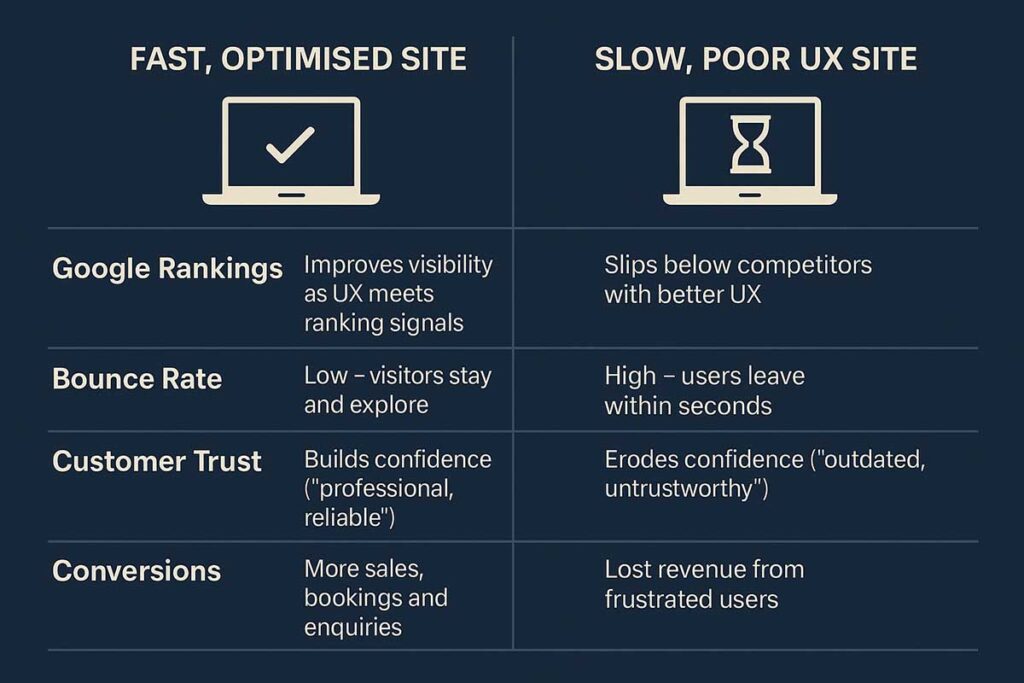Why Ahrefs Still Has Weight
When SEOs talk about backlinks, chances are they’re talking about Ahrefs. For years, it has been the industry’s “backlink intelligence engine,” alongside Semrush and Moz, as one of the three major SEO platforms.
Its strength isn’t just in raw backlink data, though its index is massive. Still, it brings multiple SEO functions under one roof, including keyword research, content insights, competitor tracking, and technical site audits.
For agencies in Bournemouth, Poole, Dorset, and across the UK, Ahrefs has become the benchmark tool for comparing visibility and keeping a close eye on what competitors are doing.
But the question is: does Ahrefs still matter as much in today’s AI-driven search world?
What SEOs Actually Use Ahrefs For
Let’s strip away the marketing hype. Here’s how Ahrefs gets used on the ground by SEOs, consultants, and agencies:
- Backlink Intelligence – Spot link-building opportunities, audit toxic links, and track competitor networks.
- Keyword Research – Understand difficulty, search volume, and click behaviour to plan content strategies.
- Competitor Insights – Site Explorer shows where rivals are getting traffic and authority.
- Content Discovery – Content Explorer highlights trending and link-worthy topics worth building around (ideal for content marketing).
- Technical Audits – Crawl your site for issues like missing tags, broken links, or speed problems (often linked to web design and Core Web Vitals).
Agencies also appreciate it because it serves as a dual-purpose reporting tool. Its graphs and visuals provide clients with a clear picture of performance without overwhelming them with technical jargon.
Do You Need Ahrefs?
Here’s the honest truth: it depends on who you are.
- Enterprise SEO teams & agencies → Almost indispensable. It saves time by replacing five or six separate tools.
- Freelancers & small businesses → Helpful, but not critical. You can replicate most of its features with a stack of cheaper or free tools.
In other words, Ahrefs is not the “golden key” to SEO. It’s a benchmark tool — great to have, but not the only way to win.
Want to Improve Your SEO Rankings?
Strong SEO means more visibility, more traffic, and more customers. At Digital Hype, we specialise in helping businesses across Bournemouth, Poole, Dorset and UK-wide climb Google rankings with strategies that actually deliver results. Let’s build an SEO plan that grows your business for the long term.
Contact Our SEO ExpertsSEO Is Shifting – Where Ahrefs Fits In
Search is no longer just about ranking on the first page. With AI-generated results (Google AI Overviews, ChatGPT, Perplexity), users often receive answers without needing to click through to websites at all. That changes how tools like Ahrefs are used:
- Backlinks Still Count — Differently
Google still looks at links, but AI search can bypass traditional SERPs. Links now need to signal trust and authority, not just volume. - Keyword Research Isn’t Traffic-Proof
Zero-click searches mean not every keyword translates into visits. Ahrefs’ keyword tools are useful, but they need to be paired with brand visibility strategies and entity optimisation via SEO. - Entities & Brand Reputation Are the Future
SEO is shifting towards entity optimisation and Generative Engine Optimisation (GEO) — making sure AI platforms understand and trust your brand. Ahrefs isn’t built for this (yet). - Competitor Tracking Still Matters
One thing hasn’t changed: knowing what your competitors are doing is essential. Ahrefs remains strong in this area, which is why agencies continue to rely on it.
What Complements or Replaces Ahrefs?
If you don’t have Ahrefs, you’re not stuck. Many SEOs run hybrid stacks:
- Screaming Frog – Technical SEO crawler.
- Majestic – Advanced backlink analysis.
- Google Search Console – Direct search performance data.
- SurferSEO or Frase – Content optimisation.
- Entity SEO & NLP tools – For AI readiness.
This suggests that Ahrefs is best viewed as part of a broader SEO toolkit, rather than a standalone solution.
FAQs on Ahrefs in 2025
Q1. What makes Ahrefs different from other tools?
Its backlink database is one of the largest and most accurate available.
Q2. Is Ahrefs essential for advanced SEO?
No. It’s extremely useful, but you can also build advanced strategies by combining it with other tools.
Q3. How do SEOs use Ahrefs daily?
Backlink tracking, keyword planning, competitor analysis, and auditing.
Q4. How relevant is Ahrefs in the AI era?
Still relevant, but it needs to be paired with GEO strategies to protect brand presence in AI search.
Q5. Can small businesses in Bournemouth or Dorset benefit?
Yes, but most SMEs access it through agencies to avoid the subscription cost.
Q6. What’s the best alternative to Ahrefs?
Semrush, Screaming Frog, Majestic, and Moz — depending on your focus.
Q7. Do backlinks still matter to Google?
Yes, but they now share the stage with UX, Core Web Vitals, and brand authority.
Q8. Should businesses buy Ahrefs directly?
Worth it for larger teams. Smaller firms often save money by working with agencies like Digital Hype, which already use it.
Lead, Don’t Lag
Ahrefs is still one of the strongest tools for backlinks and competitor insights. But SEO has moved on. If you rely on it alone, you’ll miss where search is heading.
The future belongs to those who combine traditional SEO tools with Generative Engine Optimisation, structured data, and entity-first strategies. That’s how you make sure AI search doesn’t erase your brand from the conversation.
How do tools like Ahrefs fit into a modern SEO strategy?
Talk to the team at Digital Hype. We help businesses in Bournemouth, Poole, Dorset, and across the UK combine traditional optimisation with AI-driven search strategies that protect brand visibility and drive results.


